2021 Scholarship Winners
/Congratulations to our 2021 Scholarship Recipients
Congratulations to our 2021 Scholarship Recipients

DeLaurenti has been serving Seattle for more than 75 years, including as a pick-up and delivery grocer throughout the COVID pandemic. The shop attracts highly skilled employees with specialized knowledge of the products that we sell and prepare. Our staff includes baristas; wine, cheese, and charcuterie experts; those who cook and serve the prepared food in our deli; and more. Over the last year and a half, we have kept the legacy of this local institution alive during a worldwide pandemic, delivering groceries and specialty items to customers across the city and country and serving the market community through a very difficult season.
We seek to unionize out of a sense of pride and respect, both for the work we have put in over the past year and for the special place that DeLaurenti holds in the Pike Place Market community. For us to create the best version of DeLaurenti, we know that the people who prepare, handle, and sell the beautiful food it carries should be protected, respected, and have a say in our working conditions.
We want our expertise to be recognized—both in the form of higher wages and benefits, and in our involvement in decision-making processes. With more comprehensive training, a safer work environment, and more employee input into store decisions, we hope to make DeLaurenti even better for our customers and our community as well as for each other.
DeLaurenti Food & Wine can be found on the southwest corner of First Avenue & Pike Street in Seattle.

We gathered thousands of signatures, wore buttons, held actions outside our stores, spoke up at board & CEO meetings, participated in info pickets and Contract Action Team meetings, and kept talking with each other about why we deserve representation on the co-op board and how we can work for the changes we want to see. We did this!
And our community stood with us all along the way, from signing petitions to contacting PCC administration to showing up in person at our pickets.
“We listen to hundreds of customers every day, and they told us PCC would be a better co-op for members, customers, workers, and the community with both of us on the board. We’re ready to share our expertise in shaping the values and direction of this community.” - Donna (View Ridge)
“Our co-op can expand without losing its core mission and overstressing our existing stores and staff. With our voices on the board, the decisions that steer the future of our co-op can be informed by our one-on-one conversations with our customers and working with the beautiful food from our farmers and providers.” - Laurae (Fremont)
Let’s celebrate this win, and keep the momentum going: Our bargain for a fair contract isn’t over, but we move forward knowing that when we organize, we can win. PCC members are energized, and we are ready to do what it takes to win a contract that respects our work, protects us from harm, and pays us fairly for the essential work we do.
Chris Vincent, a veteran produce worker at Bakerview Fred Meyer, helped organize co-workers to send emails and give public comment at multiple City Council meetings. Upon hearing of the victory, Vincent offered words of celebration:
The Northwest Central Labor Council, led by Secretary-Treasurer Michele Stelovich, and Whatcom County Jobs With Justice, led by Betsy Pernotto, provided crucial support to UFCW21, engaging Council Members and mobilizing supporters to send messages of support and provide comments at several meetings.
Speaking before Council on March 8, the Labor Council’s Stelovich lauded frontline grocery workers:
The Whatcom County DSA also mobilized supporters to speak up for grocery workers at multiple Council meetings.
The Northwest Grocery Association and Fred Meyer sent representatives to Council to speak against the ordinance, but there was little opposition, otherwise.
The City Council’s action last night was the culmination of a nearly year-long campaign by Bellingham grocery workers to demand continuation of hazard pay, after Albertsons and Kroger discontinued it last Spring. Members and community supporters held multiple protest actions to educate the public and sent hundreds of messages to City Council once the issue moved into the legislative arena in February.
Throughout the campaign, UFCW 21 members have also emphasized the need for improved COVID safety in their workplaces.
City Council Member Lisa Anderson shepherded the hazard pay ordinance to victory over several months, never backing down in the face of the grocery industry’s legal threats and misinformation.
The hazard pay ordinance covers workers at companies that employ at least 500 employees worldwide and at least 40 in Bellingham. At these companies, hazard pay will be required at stores that are over 10,000 sq. ft. and primarily sell groceries for offsite consumption or which are over 85,000 sq. ft., with 30% or more of their floor space devoted to groceries.
These Bellingham City Council members voted against grocery workers: Gene Knutson and Pinky Vargas
While we are gratified that the Floyd family and the community of Minneapolis received a form of justice today with a guilty verdict, we recognize that one verdict cannot fix a racist justice system. Nor can it bring back the life of George Floyd, nor the countless other Black, Indigenous, and People of Color whose lives and opportunities have been lost to racialized policing and systemic racism in its many forms.
UFCW 21 stands for economic, political, and social justice in our workplaces and in our communities. We know that racism and white supremacy keep us separated from each other and undermine our collective power, and that the best way to defeat these systems of oppression is to work in solidarity to build a diverse working-class movement. We believe in working together toward the future we want to see.
Over the past year, UFCW 21 members have continued our fight for racial justice in bold new ways, including demanding police accountability in the labor movement, attending many Black Lives Matter events, trainings, and protests, and fighting for the right to wear Black Lives Matter insignia at work, as well as standing in solidarity with nonunion workers fighting for these same rights.
We are working within our labor movement and our communities to place racial justice at the heart of our plans for the future.
To sign up to be connected with resources on how our Washington State labor movement and local Labor Councils are working for racial justice, click below:
Want Black Lives Matter buttons for your workplace? Text your name and work location to (803) 820-2121.
Read what UFCW 21 membership and leaders shared at the time of George Floyd’s death in 2020.
As COVID restrictions make it more difficult to meet in person and members face increased risks and concerns around COVID safety and other issues, we are continuing regular Telephone Town Hall calls for members to get important updates, ask questions of union leadership and special expert guests, and come together to plan how we can keep each other safe and fight for fairness at work even during this ongoing crisis.
All you have to do is pick up the phone when it rings between 5:30-5:40pm on Monday, or if you don’t receive a call, just use the call-in number and Meeting ID above.
All you have to do is pick up the phone when it rings between 5:30-5:40pm on Monday, or if you don’t receive a call, just use the call-in number and Meeting ID above.
"I am overwhelmed by the opportunity I have that hundreds of thousands who lost their lives did not. I am thrilled to protect my family, friends, and vulnerable patients. Cheers to a step towards ending this pandemic! Thank you, Lord. Thank you science!"
Roy: “It’s over with!”
Andre: “I’m happy I got the shot, I feel so much better!”
"My decision was easy. I do it for my family, friends, patients, coworkers, community and then me."
“I did it. Covid shot received!”
UFCW 21 members thanked Seattle Fire workers who provided vaccinations at a UFCW 21 vaccine event.
“I was hesitant at first. But being a primary care nurse puts me on the front lines of a battle we have been losing up to now. I got vaccinated because I don’t want to be a Covid victim, and I do want to be there for my patients.”
Roxanne: “I want to help end this and I want to protect my family and friends. And I want to hug people again!”
Robert: “I want to live! I want to be able to continue working and helping people at the grocery store. I can’t do that if I’m sick.”
"Got the first dose. Piece of cake. No reaction here. Get second dose in early January. Happy Camper. I am grateful and Thankful. Thanks to all who made this possible. This makes me so happy that this turning point will lead to the end of the pandemic. I am hopeful that everyone that wants a vaccine will get one soon. The more people that say yes and get the vaccine, the sooner the end will be of this awful virus affecting so many lives."
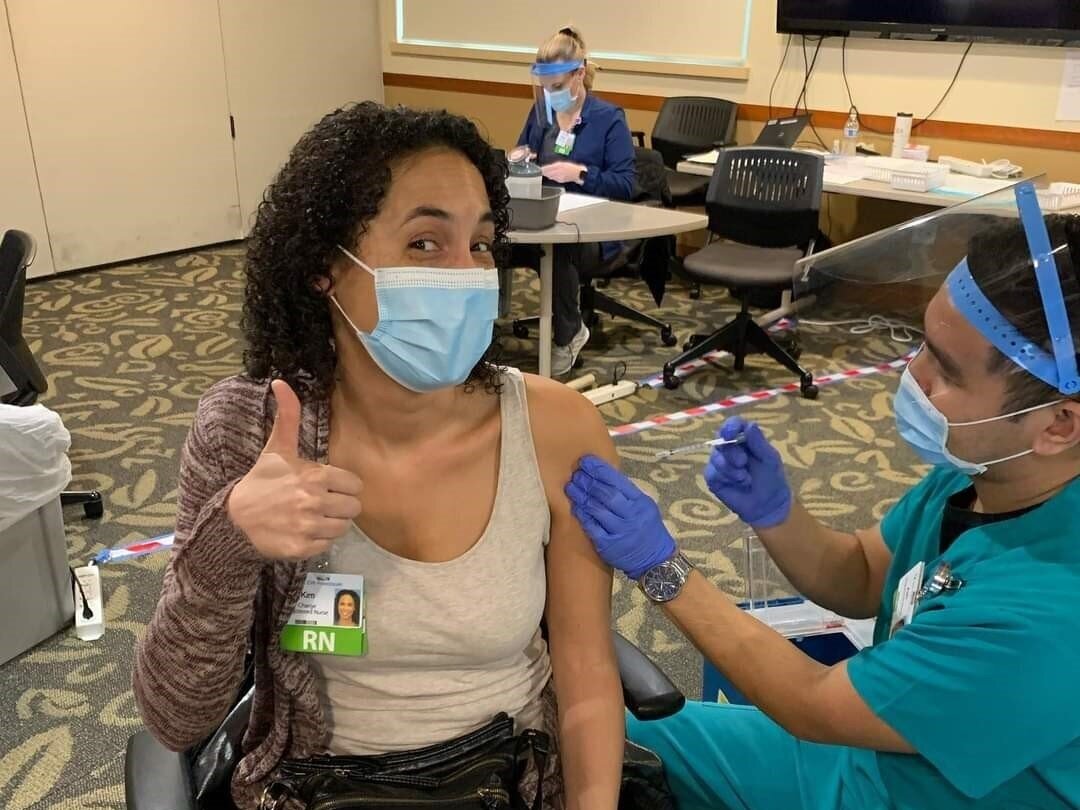

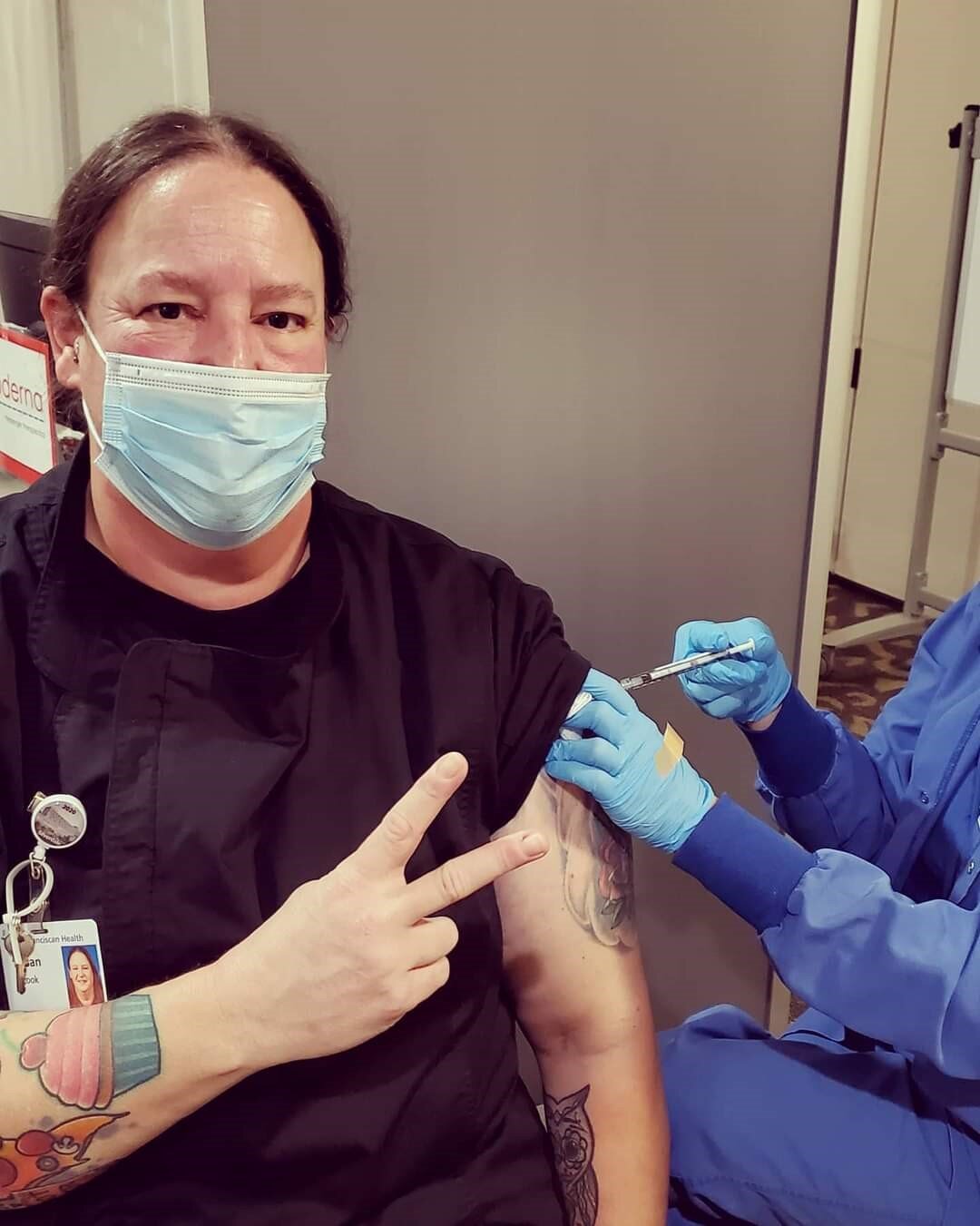
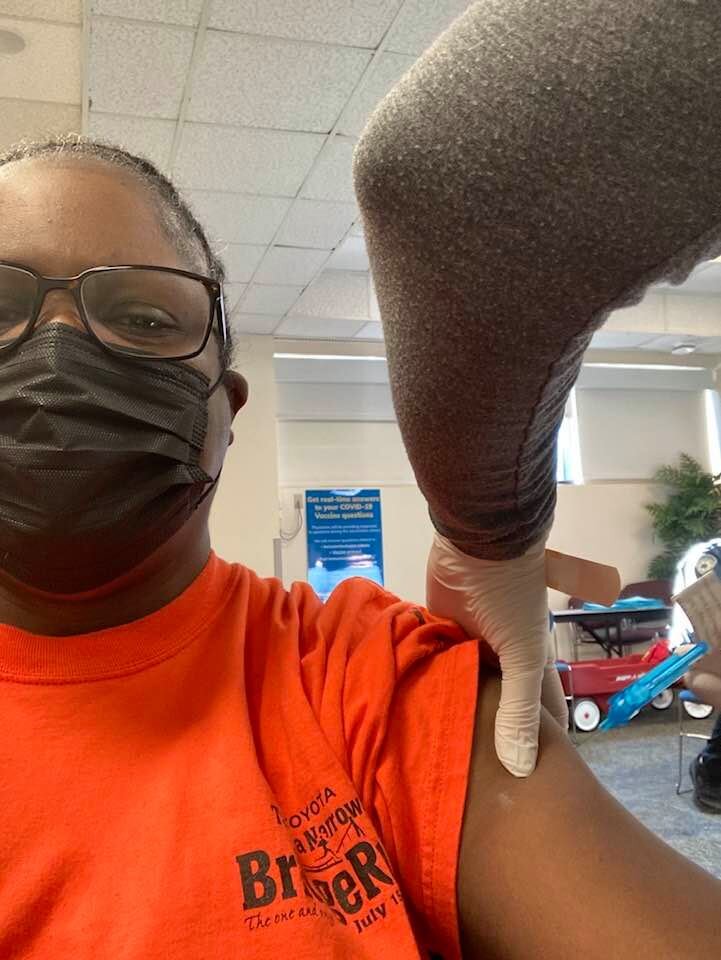


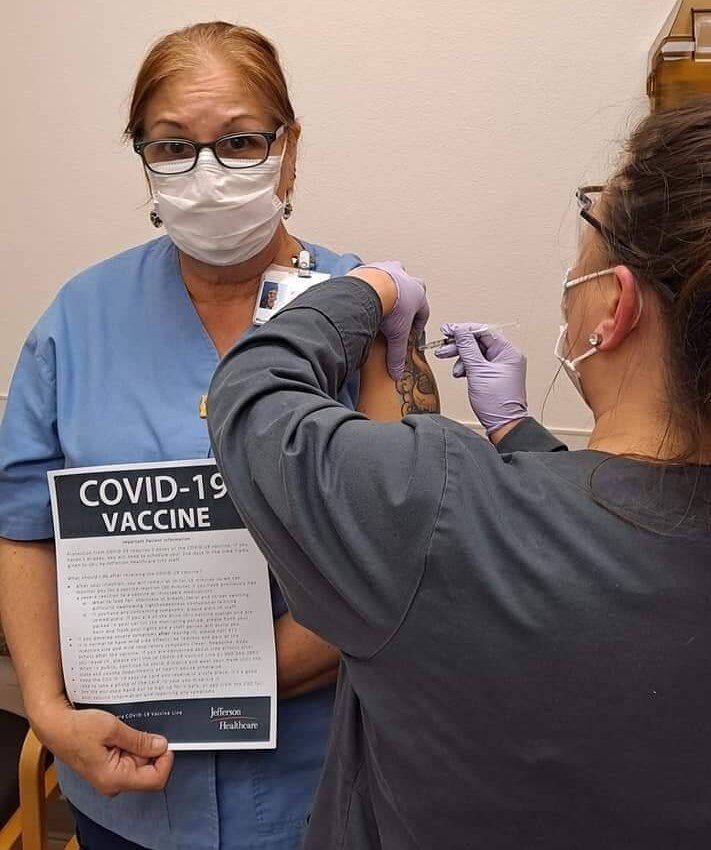
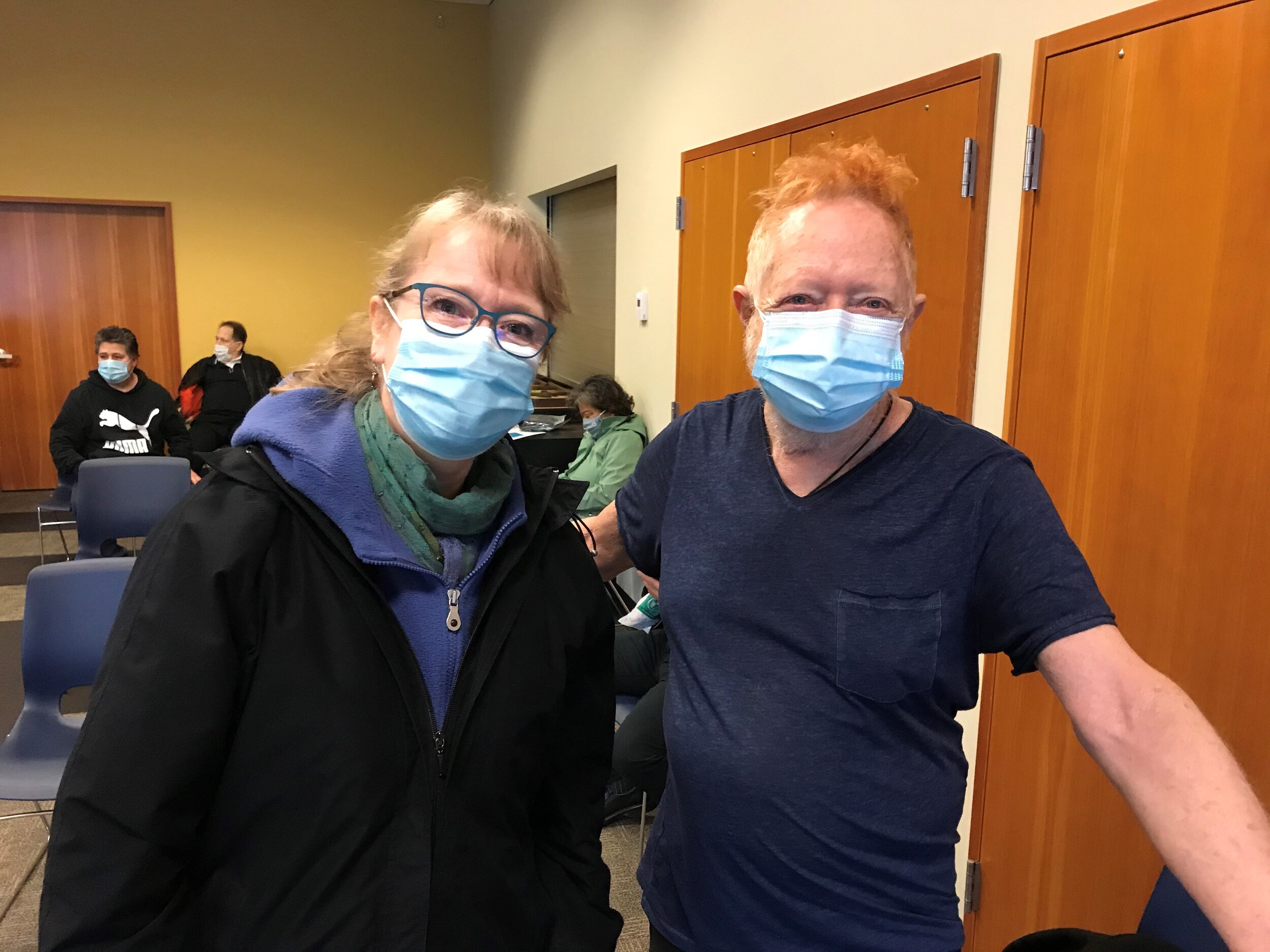



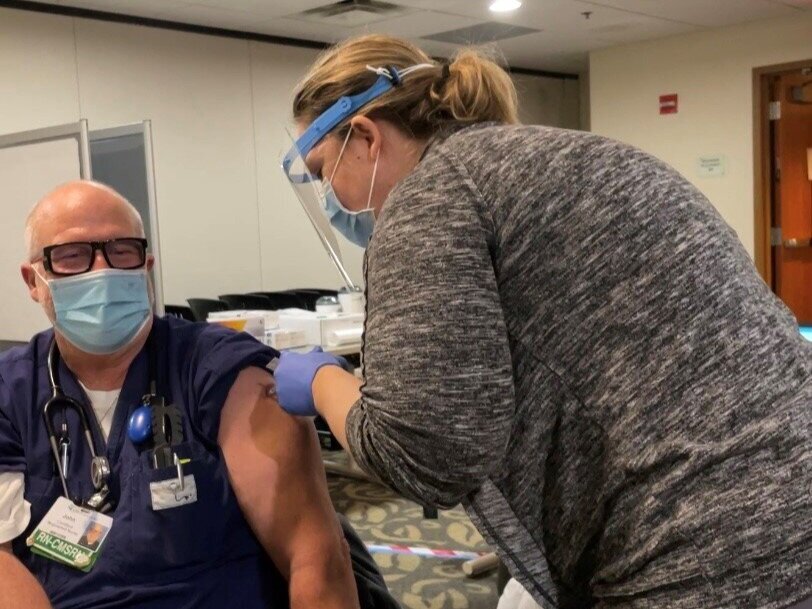


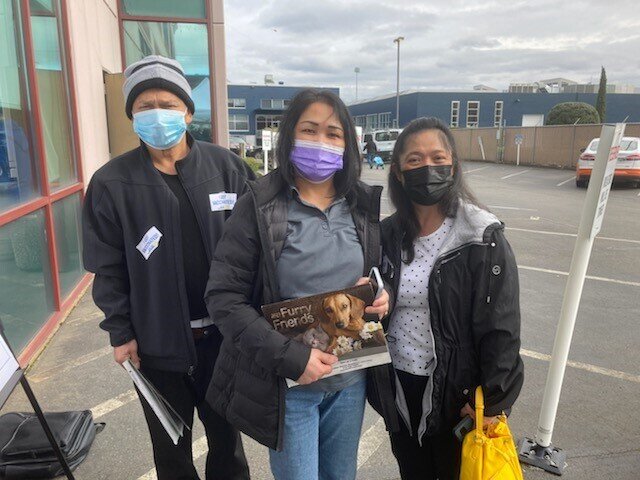
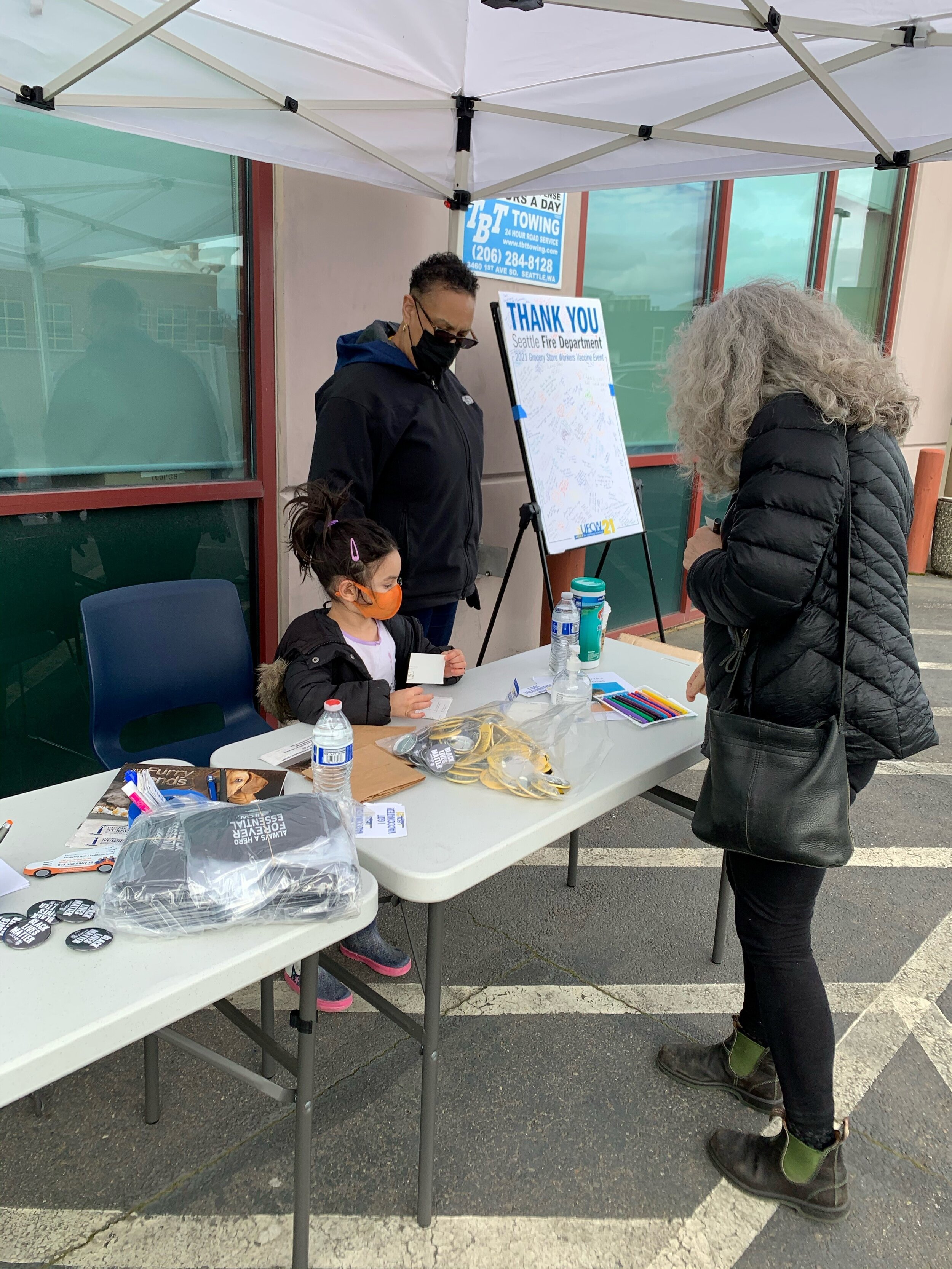
Many UFCW 21 members have already been vaccinated to protect against COVID-19. Many other members have questions about eligibility, how to find accurate vaccine information, and what we can do as a union to advocate for our right to vaccine access. Here’s the basics:
There are multiple options for people seeking vaccines in Washington State. UFCW 21 is working closely with partners at the city, county, and state level, along with our employers and our health care trust, to make free vaccines accessible to all members as quickly as possible. Here are the main ways you can get vaccinated right now:
Through your union: Speak with your Union Rep for information about vaccine appointments available to you through the union. We have held vaccination events at our union hall, and are working with partners across the state to make appointments available to UFCW 21 members at pop-up vaccination clinics, mass vaccination sites, and in our workplaces so members can access vaccines at convenient locations and times. If you have questions or need help, you can also contact us by email at vaccine@ufcw21.org.
Through your employer: Your employer may be able to vaccinate staff at work, either through a pharmacy or clinic in the workplace or a vaccination event on-site. We have worked with many employers to ensure that everyone gets access. If your employer is vaccinating people at work and you have any questions or concerns about the process, contact your Union Rep.
Through a city, county, or state-run mass vaccination site:
King County: Sign up here to be put on the notification list for available vaccines in Seattle and King County at sites in Rainier Beach, West Seattle, and at Lumen Field (formerly called CenturyLink Field) - Anyone who lives or works anywhere in King County can sign up through this form
Southern and Eastern WA: Click here to learn more about vaccination sites in Kennewick, Ridgefield, Spokane, and Wenatchee
Through a vaccine provider near you: Anyone who is eligible for a COVID vaccine can make an appointment at a provider in your area. This tool collects all available vaccine appointments in one place:
UFCW 21 members on the Sound Health & Wellness Trust can contact our Guardian Nurse service for assistance making COVID vaccine appointments by calling (877) 362-9969 and selecting option 2 (8am - 5pm).
You can also contact your Union Rep (just call our main office at 1-800-732-1188 to be connected to your Union Rep) or email vaccine@ufcw21.org.
KING COUNTY: Anyone who lives or works anywhere in Seattle or King County can call the Seattle Customer Service Line at 206-684-2489 from Monday through Saturday, between 8 a.m. - 5 p.m. for assistance. In-language assistance is available over the phone.
STATEWIDE: Call the state COVID hotline at 1-800-525-0127, then press #. You can request help making a vaccine appointment.
There are three approved vaccines for COVID-19: one made by the company Pfizer (sometimes called the Pfizer-BioNTech vaccine), one by the company Moderna, and one made by the company Johnson & Johnson (sometimes called Janssen). Currently, the Pfizer vaccine is authorized for people ages 16+ and the Moderna and Johnson & Johnson vaccines are authorized for ages 18+. There are more vaccines in late-stage trials and in earlier phases of development and testing. On April 13, the CDC recommended states pause in administering the Johnson & Johnson vaccine while they evaluate it further, and Washington State vaccine providers have complied.
There is a lot of information out there about COVID vaccines. We encourage members to look at the verified scientific information about these vaccines and be thoughtful about the sources of the information you rely on for a decision like this. Getting vaccinated is a choice, but it is a choice that affects your health and safety and our whole community, and it can help bring an end to a global health crisis.
Here are some places to start:
Our local and our international union feel strongly that essential workers have served our communities throughout this crisis and many of us are facing high risk of exposure at work, whether from the public or from close contact with coworkers. We have been advocating at the federal and local level from the very beginning of vaccine prioritization discussions for priority vaccine access for all frontline workers, including those in health care, grocery stores, meatpacking and food processing, and any other frontline essential workers.
Our state has formed a partnership with companies, organizations, and unions that have the expertise to help ramp up our state’s ability to vaccinate people safely and quickly. We will ensure frontline workers have a voice in the broader plan for vaccination throughout this process, along with our role ensuring a high level of training and coordination.
KIRO 7: Intense lobbying underway to move essential workers up in vaccine line (12/10/20)
NW News Network: Teachers, grocery workers, prison guards and oldest Americans may be next in line for COVID vaccine (12/22/20)
KING 5: Union wants Washington grocery store workers vaccinated as soon as possible (1/4/2021)
Q13: Confusion over Washington state vaccine timeline grows (1/15/21)
KING 5: Washington starts COVID-19 vaccine Phase 1B with lower age threshold and adds more mass vaccine sites (1/18/21)
MyNorthwest: Gov. Inslee unveils public-private partnership to ramp up vaccine distribution statewide (1/18/21)
Public Health Insider: One Million Shots and Counting: A Tribute to the Community Partners Who Helped Us Get Here (4/7/21)
NEW April 8, 2021: The proclamation protecting high-risk workers has been updated in the face of increased vaccination of Washington’s population, the length of the COVID-19 pandemic, and updates to the CDC’s categories of at-risk people. The information on this page has been updated to reflect the new modifications to these protections.
Workers who are covered by this proclamation are called “high risk employees,” and the term means anyone defined by the Centers for Disease Control as being more likely to get severely ill from COVID-19, as outlined on the CDC’s website listing risk factors and medical conditions that current science says may make someone more likely be hospitalized, need intensive care, require a ventilator to breathe, or even die if they were to contract COVID-19. Click the button below for the CDC’s list of these conditions.
In Washington State, your employer is required to provide accommodations to you at work that protect you from risk of exposure to COVID-19 if you are a high-risk employee and you request accommodations. These accommodations can include, but are not limited to:
telework
alternative or remote work locations
reassignment
social distancing measures
If your employer determines that an alternative work arrangement is not feasible for you, they must permit you to use all your available accrued leave options or unemployment insurance, in any sequence and at your discretion, and they cannot retaliate against you for doing so. If you use up your paid time off, your employer still cannot permanently replace you at work for exercising your rights under this proclamation.
Effective April 23, 2021, your employer can require medical verification to confirm you are covered under these protections. According to the Governor’s new order, they are required to follow the same interactive process required by state and federal disability laws, which means you should have a reasonable amount of time to respond. You or your employer can start the process of providing medical verification as soon as April 9, 2021, but your employer can’t mandate that you start this process before April 23, 2021.
Also effective April 23, 2021, your employer does not have to maintain your employer-related health insurance benefits unless you are otherwise eligible for Family Medical Leave Act (FMLA) status or an extension of your benefits is covered by your contract or other condition of employment.
If your employer wishes to terminate your health benefits or change your alternative work arrangement, they must give 14 days notice in writing. They are still required to utilize all available options for alternative work assignments to protect you from exposure to COVID-19 if you are a high-risk worker and you request protections. These protections are in effect for both public- and private-sector workers. There are no exceptions.
If you would like to exercise your rights under this proclamation, and your employer doesn’t allow you to do so, connect with your Union Rep for help.
Worker successfully made the case for some updates to our state’s unemployment insurance system, and that has included making high-risk workers’ eligibility for unemployment insurance during public health emergencies like the COVID-19 pandemic part of state law. Thank you to the workers who fought for these protections and the lawmakers who listened. Read more about this state law here.
As of April 4, 2021, an unemployed person who has left work voluntarily and is high risk or lives with someone who is high risk is eligible for unemployment benefits in our state. Speak with your Union Rep to discuss your options for workplace accommodations that will protect you and unemployment insurance benefits if you are on leave.
Scroll down for a list of answers to Frequently Asked Questions on our state’s high-risk worker protections and a list of health conditions that may put you at higher risk for serious COVID-19 complications.
Governor Inslee’s modification of the original proclamation (April 8, 2021)
Governor Inslee’s extension of the proclamation (July 29, 2020) - This extension will be rescinded as of April 23, 2021
Governor Inslee’s memo clarifying the extension of the proclamation (July 29, 2020) - This memo will be rescinded as of April 23, 2021
Governor Inslee’s original proclamation protecting high-risk workers (April 13, 2020)
CDC’s list of conditions that may put you at increased risk for severe illness from COVID-19 (revised March 29, 2021)
No. There are no exclusions. Regardless of your job, if your health care provider determines you are a high-risk employee, your employer must offer you accommodations and protections under this proclamation.
Your employer can require medical verification from a health care provider who assesses your medical condition, vaccination status, and the circumstances of your job or workplace to determine whether you are high risk and whether you can return to the workplace with additional accommodations to protect you from exposure. If your employer is not accepting documentation you think is sufficient, contact your Union Rep for support.
No. Providing your employer with documentation of your status as a high-risk employee does not give a health care provider the right to share further information about your health with your employer, unless you have given them explicit permission to do so. (If you signed a document releasing your medical information, check carefully to see what it allows your provider to share.) Sharing medical information without your consent could be a violation of the Health Insurance Portability and Accountability Act (HIPAA), and if it happens you should contact your Union Rep to determine next steps that protect your privacy and your right to accommodations.
No, you have a say in what accommodations are safe for you. The governor’s proclamation says decisions about this “cannot be left solely to the employer.” Again, if your employer is not offering acceptable accommodations, talk to your Union Rep.
You may be able to choose leave instead of telework, but it’s not a guarantee. You should request what you think is safe and fair, and get support from your Union Rep to make it happen if your employer refuses to accommodate you. The state has asked employers to be flexible with employees and respect requests for leave, and gives you a say in what you consider safe. Your employer may be able to argue that telework is appropriate.
If your medical provider has verified that you are a high-risk employee and should not return to the workplace, your employer cannot require you to return by threatening to terminate your position, and they must continue to provide you with accommodations that protect you against exposure to COVID-19.
You can use any accrued leave you have, including vacation, sick, compensatory time, exchange time, personal holiday, or federal Emergency Paid Sick Leave. You can also use Unemployment Insurance during your time away from work, even though your employer is not allowed to permanently replace you.
When you file for unemployment, your employer should provide the state’s Employment Security Department with appropriate documentation to support your unemployment claim. If you need help applying for unemployment, contact your Union Rep or get in touch with our partners at the Unemployment Law Project.
No. Under this proclamation, workers in high-risk categories are allowed to use accrued leave or unemployment insurance in any order and at your discretion. Your employer cannot force you to use up your accrued leave before you file for unemployment.
The CDC has altered the way they categorize the risk factors and medical conditions that can put people at increased risk for severe illness if they were to contract COVID-19. There is no longer a distinction between “at increased risk” or “might be at increased risk.” Instead, they list all health conditions or health histories that current science says may contribute to a person’s higher risk of COVID complications, and they provide links to the science they rely on to make these decisions. The CDC list is regularly updated, and includes a link at the top of the page so you can see the last time they made an edit to their list. As of April 13, 2021, here are some of the health conditions that are included:
Cancer or a history of cancer
Chronic lung or kidney disease
Dementia or other neurological conditions
Diabetes
Down syndrome
Heart conditions
HIV
Weakened immune system (being immunocompromised)
Liver disease
Body Mass Index over 25 (being overweight or obese)
Pregnancy
Sickle cell disease or thalassemia
Being a current or former smoker
Solid organ or blood stem cell transplant
Stroke or cerebrovascular disease
Substance use disorders (such as alcohol, opioid, or cocaine use disorder)
For Immediate Release: Monday 4/12/21 | Contact: Tom Geiger, UFCW 21, 206-604-3421
SEATTLE, WA — Today, UFCW 21, the region’s largest labor union, announced its endorsement of Council Member Lorena González for Seattle Mayor. The working partnership with our worker-led union goes back nearly a decade — a decade of both great progress and great strife for working people in our city. The Mayor of Seattle can be a major force for leading change and our belief is that González is the best candidate for our city and that she will help meet the potential to reduce inequity, reduce racial injustice, and improve the rights and daily lives of working people. UFCW 21 has been at the center of efforts for over a decade to forward workers’ rights and lead the nation.
González reacted to the news: “I’m proud to have the support of UFCW 21's 46,000 hard-working members. Their workers are vital to our city's economy and have been on the front lines during the COVID-19 pandemic. I'm proud to have worked with UFCW 21 on the city council to establish the Office of Labor Standards, protect workers from scheduling instability and to provide hazard pay for grocery store workers during the pandemic. As Seattle's next Mayor, I will continue to work with our essential workers to ensure the safety and health of working people and to create good-paying jobs."
Our city was one of the first to pass a dramatically higher minimum wage, paid sick days, secure scheduling, and most recently hazard pay for essential grocery store workers. González has been there with us all along the way, providing savvy, principled and progressive leadership.
"Council Member González was a great partner in the fight for the Secure Scheduling law to help us have more control over our schedules at work and to better plan time with family. As a grocery store worker and elected board member of UFCW 21, I'm very happy she has our full support to become Seattle's next mayor," said Maggie Breshears who works at Fred Meyer in Greenwood.
"Last year, after continued problems and the Seattle Police Officers Guild’s refusal to meet community demands for major police reform and accountability, UFCW 21 heard the community’s demands, and we took a leadership role in the Labor community and fought for and succeeded at having SPOG removed from the MLK Labor Council. Everyone, people of all races and economic levels need police justice and should have equal access to that justice in our communities. Seattle has a lot of work to do along these lines and we feel Council Member González can help lead that work as Mayor," said Sam Dancy, a longtime QFC worker in West Seattle and elected Executive Board member of UFCW 21.
As an at-large member of the council, González has been elected by voters across the city. And as an attorney and advocate, she has a long record of caring, action and success for the working people of the city and beyond. Her own story combines the hard struggle of an immigrant family, a farmworker family. She understands firsthand the trials of racism, the inequality in our economy, as well as the benefits of getting a strong public education and the importance of getting organized and involved in community.
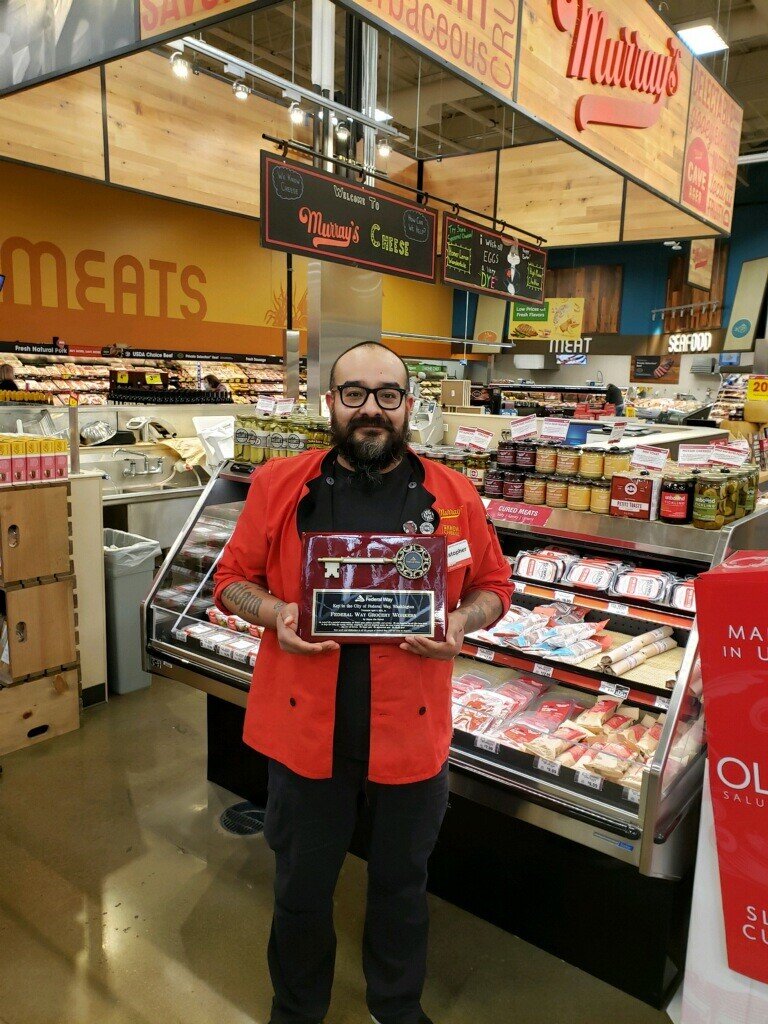
Chris Navarrette, Cheese Monger at Fred Meyer #111 Federal Way accepting the Keys to the City of Federal Way
Chris was also honored for his work on a hazard pay ordinance in the City of Federal Way. After speaking up about hazard pay in a video for union negotiations with Fred Meyer, Chris attended a UFCW 21 webinar on what it takes to organize around hazard pay at the city level. He helped spur negotiations for a Federal Way hazard pay ordinance, which is now being considered by Federal Way City Council, and he testified at a city council meeting.
Here’s what Chris had to say at his Key to the City ceremony:
“Good evening, I am honored to accept this key to the city on behalf of all grocery workers in Federal Way. Since the start of this pandemic, grocery workers have gone to work every day, putting themselves and their families at risk in order to keep our communities fed. I am grateful that the Mayor and the City Council are recognizing the hard work of grocery workers during this unprecedented time. I am also pleased that the city is going to consider hazard pay for grocery workers. While I am the individual that is accepting this award, it is truly deserved by each and every grocery worker in this city. Thank you again for this honor, and it is a privilege to participate in this ceremony with so many other essential workers.”
Want to organize around workers’ rights in your area or get involved in local politics where you live to help make sure working people have a voice? Talk to your Shop Steward or Union Rep about how to get involved!

MEDIA ADVISORY for Thursday, April 8, 2021 at 11 AM
For immediate release: April 7, 2021
CONTACT: Tom Geiger, UFCW 21, 604-3421
Seattle, WA – On Thursday, April 8th, essential frontline grocery workers, community members, and supporters in California and Washington will host a symbolic “donation collection” in front of stores set to close, to help raise funds for the top supermarket chain in the country to pay its workers temporary hazard pay and call on Kroger Co. to keep stores open.
In a theater performance style, workers and community members will ask shoppers to donate pennies in a collective piggy bank to pitch in and help pay essential workers to shame Kroger over its greedy behavior.
Kroger owns the California Ralphs and Food 4 Less stores and Washington QFC stores slated to shut down. The corporation falsely claims that these supermarkets are closing as a result of hazard pay when in reality it was a clear effort to intimidate workers, the community, and elected officials in an attempt to discourage any additional hazard pay ordinances from passing.
Thursday’s actions will symbolize the extreme disparity between the company’s windfall COVID profits and its decision to cut workers’ pay since May 2020, despite persistent elevated sales and risk to employees.
WHO: Workers, customers, and community members in Long Beach, Los Angeles, and Seattle
WHAT: Simultaneous demonstrations in LA, Long Beach & Seattle. Workers and community members impacted by the store closures will call out Kroger’s bullying and the greed that is driving their retaliatory actions closing stores that workers and communities depend on.
VISUALS: Blow-up piggy bank, jumbo pennies, and donation stand in front of the store
BACKGROUND: Local hazard pay ordinances have been passed in cities across California and in Washington, honoring workers for the sacrifice they make coming to work in a pandemic while others can work from home. In response to these temporary ordinances, Kroger Co. is the only grocery company announcing they will close stores instead of complying with the laws. Numerous requests for injunctions by the grocery industry challenging the hazard pay laws have been denied.
According to a Brookings Institution analysis, many of the United States’ top retail companies have earned record-breaking profits during the pandemic, but this increase in profit has not made its way back to workers. Grocers nationwide instead used their excess pandemic profits to buy back shares all the while threatening to close down stores and misleading the public that hazard pay would have to be passed onto consumers.
Here’s what we’re doing right now:
We have sent a cease & desist letter to KP ordering them to immediately cease demanding any repayment of past wages they believe are incorrect, unless and until they offer all necessary information and can accurately document and verify the basis for their demands.
We have filed a grievance over this issue and an extensive information request, including a request for a full audit to determine if members were under- or overpaid, a clear explanation of their basis for demanding repayments, and copies of all of their communication with staff over this issue.
The National Alliance is involved in investigating and addressing this matter with KP at the national level.
UFCW 21 is fully investigating this matter here in Washington with our Union Rep, UFCW 21 bargainer, and UFCW 21 legal team, and assessing our contractual and legal options to make sure everyone is protected from pay errors and any overreach on the part of KP.
We all deserve to be paid for our work, paid accurately and on time, and for any discrepancies to be well-documented and explained. This is unacceptable behavior from KP and we will be working together to make it right and hold them accountable if they continue to mistreat KP workers.
As we saw last week, with the murder of six Asian women in their places of work in Georgia, Asian American and Pacific Islander communities are targets for violence which has gone up over 150% in the last year. UFCW 21 AAPI members, in additional to putting their lives at risk in the middle a pandemic to feed and care for us, have faced verbal threats and physical violence from customers, patients, and colleagues in their workplaces. Customers have also attacked AAPI customers in our grocery stores.
“Our Asian American communities in Washington State are vital parts of the fabric of our society. My neighborhood of White Center is vibrant because of the diverse Asian American communities who live here. These are my neighbors, my customers, and my friends, and I am committed to ensuring that they are safe walking in our neighborhoods and coming into our grocery stores.” -Jeannette Randall, UFCW 21 Executive Board Member
UFCW 21 is committed to confronting and ending racism in all of its forms. We believe that until everyone is safe at work, no one is safe, and we all need to be part of making that real. We take our lead from Asian Pacific American Labor Alliance (APALA), API Chaya and other AAPI-led partner groups. The UFCW 21 executive board encourages everyone to attend the upcoming United Against Hate-APALA workshop to learn our history, so that we can take action in our present.
UFCW 21 signed on to a solidarity statement by Asian Americans Advancing Justice, and United Against Hate encourages all to sign on.
UFCW 21
For immediate release: 3.18.2021, 12:35 PM
Contact: Tom Geiger, 206-604-3421 ( c )
In an effort to provide some compensation for the hard work and sacrifice of grocery store workers during the current health crisis of COVID 19, Seattle passed a hazard pay ordinance that went into effect on February 3rd. The industry quickly filed a lawsuit attempting to reverse this new law. Today the judge ruled against the industry. The city’s hazard pay law will remain in place.
Faye Guenther, President of UFCW 21 stated in response to the judge's decision:
On Thursday, March 11, President Joe Biden signed the COVID relief bill into law. This will provide millions of workers and families with the urgent relief they need as the COVID-19 pandemic continues.
Relief Payments: Provides $1,400 in relief payments per person for individuals making less than $75,000 and married couples making less than $150,000. along with additional tax relief for working families with children.
Childcare: Includes $15 billion for the Child Care and Development Block Grant and allows those funds to be used by essential workers.
COVID Testing and Vaccine: Provides funding towards testing, contact tracing, PPE, and vaccine distribution.
Health and safety: Provides $200 million for pandemic-related worker protection activities at the Labor Department, half of which would go to the Occupational Safety and Health Administration (OSHA) to support OSHA enforcement and worker training in high-risk sectors such as meat processing, health care, correctional facilities and agriculture.
Extends unemployment benefits: Extends pandemic-related unemployment assistance that was set to expire on March 14, including the current $300 supplement to unemployment benefits, for another six months through Sept. 6. Provides that the first $10,200 of unemployment benefits received by taxpayers making less than $150,000 will not be subject to federal taxation.
Retirement Security: Strengthens the entire pension system by helping pension plans that are in danger of failing.
This afternoon the King County Council voted 8-1 to pass a $4/hour Essential Grocery Store Worker Hazard Pay measure. This ordinance will cover large grocery stores in unincorporated King County, which are stores that are usually left out of city-level ordinances like those passed in Seattle and Burien. Grocery store workers at locations in unincorporated King County will now earn an extra $4/hour until the end of the county’s COVID state of emergency.
“Watching this ordinance pass today made me really emotional,” said Jeannette Randall, UFCW 21 executive board member and shop steward at the Roxbury Safeway, a store that would be covered by this ordinance. “This vote and passing of this ordinance shows that local government can help improve the lives of workers. This legislation passing shows that King County Council cares about the vital service grocery workers provide for our community."
Grocery store workers in unincorporated areas in King County organized to let the county council know what it’s been like to work on the front lines of the pandemic, maintaining our community’s access to food throughout this global crisis. Workers contacted council members and spoke out in public comment at council meetings, sharing stories of their own and their family members’ illnesses, the fear of showing up to work when it doesn’t feel safe, and the courage it has taken to face a constant risk of exposure just to keep our neighbors and families fed and supplied.
Grocery stores have made profits not just during the COVID pandemic, but because of it, as people’s shopping habits were forced to change while schools, restaurants, and many workplaces were shut down or limited. Today, King County Council Members like Rod Dembowski, who sponsored this ordinance, and Dave Upthegrove, who co-sponsored it, along with King County Executive Dow Constantine, have shown their support for the county’s essential grocery store workers.
“It’s been so hard watching my dad’s health decline after contracting COVID-19. The hardest part is knowing I might be the one that exposed him to this disease because of my constant contact with people at work.” -Marcie Griffin, Roxbury Safeway
“I have severe lung damage due to COVID-19 and had to spend months on an inhaler to help with the symptoms. My daughter still coughs profusely and sounds like she’s been smoking for years. These are some of the impacts this pandemic has had on my family.” -Tiffany Melligan, Roxbury Safeway
“We all need help right now. We are barely making it on the wage we are given, and we need help to support our families where most of our children are not in school. We need the support of our companies.” -Lindsay Young, Kent Fred Meyer
Voted in Favor:
Rod Dembowski: 206-477-1001, rod.dembowski@kingcounty.gov
Girmay Zahilay: 206-477-1002, girmay.zahilay@kingcounty.gov
Kathy Lambert: 206-477-1003, kathy.lambert@kingcounty.gov
Jeanne Kohl-Welles: 206-477-1004, jeanne.kohl-welles@kingcounty.gov
Dave Upthegrove: 206-477-1005, dave.upthegrove@kingcounty.gov
Claudia Balducci: 206-477-1006, claudia.balducci@kingcounty.gov
Pete von Reichbauer: 206-477-1007, pete.vonreichbauer@kingcounty.gov
Joe McDermott: 206-477-1008, joe.mcdermott@kingcounty.gov
Voted Against:
Reagan Dunn: 206-477-1009, reagan.dunn@kingcounty.gov
A huge thanks to everyone that signed petitions in November and December to put Donna Rasumussen and Laurae McIntyre on the ballot for the PCC Board of Trustees elections! We have received official verification of those signatures from PCC, which means that workers will be on the ballot for the first time in decades.
Voting will be April 8-May 3; PCC will send ballots via email. To be considered an active member who is eligible to vote, you must meet the following requirements by today, March 4, 2021:
Your membership is paid in full.
You have purchased merchandise, cooking classes or gift cards using your PCC membership since March 5, 2020.
Learn more about Donna and Laurae:

I’ve been a member of PCC since the 1980s, and I have family whose porches used to be part of the co-op’s original network of drop-off spots in the ’50s! I came to work at PCC about 6 years ago, wanting to work somewhere that aligns with my values and where I get to interact directly with a lot of people in my community. Our role has only become more important now, during the COVID pandemic. For lots of people, coming to the grocery store is one of their only opportunities for community and connection, along with healthy food. I’ve been really humbled by this experience and the appreciation our customers have shared with us.
PCC is a community. People become members because of what we stand for. We support local producers instead of corporate ones, our food is clean and handled properly from its beginning to the store shelves. People work here because of what we stand for, too. As a union shop steward in my store, I get to welcome new people to our staff. We have a young and vibrant workforce that is pushing us to step up on racial equity, LGBTQ inclusion, and justice for workers all along the food supply chain—including the workers in our own stores.
I want to make sure my coworkers are represented on the Board of Trustees.
PCC has been expanding so fast recently, focusing on opening new stores and big remodels. That’s great, I’m happy for us to grow. But given that the people who are usually on the Board of Trustees are business focused, some with no retail experience whatsoever, PCC workers agree we need some representation on the Board. We’re the ones working in these stores day in and day out. We want to protect the core mission of the co-op, the reasons why we work here, and why our members shop here.
With a worker voice on the Board, the decisions that steer the future of our co-op can be informed by the people interacting one-on-one with our customers and working with the beautiful food our farmers provide. We’re ready to have a voice in shaping the values and direction of this community.

I’m a working mom, and my whole family is invested in the mission and success of PCC—in fact, my partner and two teenage sons all work for the co-op. In my 40 years of customer service, I think PCC has hands-down the best customers I’ve ever worked with.
As PCC focuses on its growth, many of my coworkers and I feel it’s time to again have a worker voice on the Board of Trustees to ensure that customers, workers, and our community are kept front and center in decision-making. Members helped build this co-op, and as someone who interacts with our members and customers every day, I want them to know we’ve got their backs and that they can trust us. I spend money here because I trust us and I believe our co-op can grow, while holding onto its mission, values, and connection to the community.
I’m passionate about fair trade, gender and racial equity, affordable housing, and community living. For 10 years now, I have lived in a co-op housing community, where I take an active role and hold a position in community leadership. I’ve been a grocery store worker and active member of my union (UFCW), since the 1980s, serving on the union bargaining team during the big 1989 grocery strike. I also worked for QFC for 12 years, before and after it was bought by Fred Meyer and then the national chain Kroger. I experienced firsthand what happens when a well-loved community grocery store strays away from and loses what makes it unique. I have proudly been at PCC for more than 6 years now.
I’m committed to helping PCC continue to thrive while staying focused on our mission. That means connecting authentically with the communities we’re moving into as we open new stores. It means making sure PCC workers can afford to shop at our stores and live in our communities. When PCC takes care of its frontline staff, we can better take care of our customers. It also means continuing to support our small farmers and local vendors, even if they can’t produce enough to get their product in every one of our expanding locations. After all, as a co-op, our stores should be a reflection of our communities.
Right now, 8 months into the pandemic it remains stressful for most people to shop for food. My coworkers, including my boys, and I have committed to provide our customers access to fresh, healthy food in a safe and sanitized environment. We do our best to hold each other up and try to stay healthy ourselves, while working during such difficult times.
If I ring up your groceries or pass you in the aisle, please be sure to say hi!
We are the Union. The members of UFCW 3000 are over 50,000 members working in grocery, retail, health care, meat packing, cannabis, & other industries across Washington state, north-east Oregon, and northern Idaho. UFCW 3000 is a chartered member of UFCW International with over 1.4 million workers in North America.
To build a powerful Union that fights for economic, political and social justice in our workplaces and in our communities.